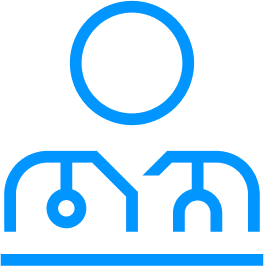Risk Conditions


People with some medical conditions
placehoder
Symptoms
Pneumococcal pneumonia can come on quickly and symptoms can appear suddenly. It can take weeks before you feel like yourself again.1,2
Symptoms can include:1-3
- High fever
- Excessive sweating
- Shaking chills
- Fatigue that makes it hard to get through the day
- Difficulty breathing
- Chest pain
- Cough with phlegm that persists or gets worse
Conditions may include4
Cardiac disease
- congenital heart disease
- coronary artery disease
- heart failure
Living with this/these risk condition/s puts you at higher risk of pneumococcal pneumonia. If you’re living with multiple risk conditions, your risk increases further.
Chronic respiratory disease
- suppurative lung disease, bronchiectasis and cystic fibrosis
- chronic lung disease in preterm infants
- chronic obstructive pulmonary disease (COPD) and chronic emphysema
- severe asthma (defined as requiring frequent hospital visits or the use of multiple medications)
- interstitial and fibrotic lung disease
Living with this/these risk condition/s puts you at higher risk of pneumococcal pneumonia. If you’re living with multiple risk conditions, your risk increases further.
Chronic renal disease
- relapsing or persistent nephrotic syndrome
- chronic renal impairment – eGFR <30 mL/min (stage 4 disease)
Living with this/these risk condition/s puts you at higher risk of pneumococcal pneumonia. If you’re living with multiple risk conditions, your risk increases further.
Chronic liver disease
- chronic hepatitis
- Cirrhosis
- biliary atresia
Living with this/these risk condition/s puts you at higher risk of pneumococcal pneumonia. If you’re living with multiple risk conditions, your risk increases further.
Children born less than 28 weeks gestation
Diabetes
Functional or anatomical asplenia
- sickle cell disease or other haemoglobinopathies
- congenital or acquired asplenia (for example, splenectomy) or hyposplenia
Living with this/these risk condition/s puts you at higher risk of pneumococcal pneumonia. If you’re living with multiple risk conditions, your risk increases further.
Immunocompromising conditions
- congenital or acquired immune deficiency, including symptomatic IgG subclass or isolated IgA deficiency
- haematological malignancies
- solid organ transplant
- haematopoietic stem cell transplant
- HIV infection
- immunosuppressive therapy, where sufficient immune reconstitution for vaccine response is expected; this includes those with underlying conditions requiring but not yet receiving immunosuppressive therapy
- non-haematological malignancies receiving chemotherapy or radiotherapy (currently or anticipated)
Living with this/these risk condition/s puts you at higher risk of pneumococcal pneumonia. If you’re living with multiple risk conditions, your risk increases further.
Previous episode of invasive pneumococcal disease
Proven or presumptive cerebrospinal fluid (CSF) leak
- cochlear implants
- intracranial shunts
Living with this/these risk condition/s puts you at higher risk of pneumococcal pneumonia. If you’re living with multiple risk conditions, your risk increases further.
Trisomy 21
Smoking
- Current or in the immediate past
Living with this/these risk condition/s puts you at higher risk of pneumococcal pneumonia. If you’re living with multiple risk conditions, your risk increases further.
Harmful use of alcohol
- Consuming on average ≥60 g of alcohol (6 Australian standard drinks) per day for males
- Consuming on average ≥40 g of alcohol (4 Australian standard drinks) per day for females)
Living with this/these risk condition/s puts you at higher risk of pneumococcal pneumonia. If you’re living with multiple risk conditions, your risk increases further.
Take the risk assessment
Answering a few quick questions will help you and your doctor understand if you are at risk of contracting pneumococcal pneumonia.

Start

Question 1 of 4
What is your age?
Age can be a risk factor, even if you're healthy.
- I am a parent of a baby
- I am under 50
- I am 50-64
- I am 65-69
- I am 70 or older
Next
Question 2 of 4
Do you have any of these health conditions?
Certain conditions may put you at higher risk for pneumococcal pneumonia, even if they're under control. The medicines you take may also affect your risk. Select all that apply.
- Yes
- No
Please select all that apply
- Asthma
- Chronic lung disease
- Heart disease
- Diabetes
- Chronic renal failure
- Certain cancers
- Non-functioning spleen (asplenia)
- HIV
Next
Question 3 of 4
Do you take a medicine that suppresses your immune system?
This includes some medicines that treat psoriatic arthritis, rheumatoid arthritis, Crohn's disease or ulcerative colitis, among other conditions.
- Yes
- No
Next
Question 4 of 4
Do you identify as Aboriginal or Torres Strait Islander?
- Yes
- No
Submit
Results
Based on your answers, you may not be at increased risk of pnuemococcal pneumonia right now, but you should still take it seriously. The truth is, your risk actually increases as you age.
NEXT STEPS
Stay vigilant and check in with your doctor if your health circumstances change.
Results
Based on your answers, you may be at
increased risk of pnuemococcal pneumonia
and should take steps to protect yourself.
Next Steps
Talk to your Doctor, Nurse or Pharmacist about how you can protect yourself against pneumococcal pneumonia. Bring a copy of this assessment with you to help get the conversation started.
Download Results
Start over
References
- Pneumonia. Health Direct. Pneumonia - causes, symptoms and treatments | healthdirect Accessed Sep 8, 2023.
- Goldblatt D, O’Brien KL. Pneumococcal Infections. Chpt 141 In: Jameson J, Fauci AS, Kasper DL, et al. eds. Harrison's Principles of Internal Medicine, 20e New York, NY: McGraw-Hill. Accessed June 11, 2020.
- Pneumonia. Lung Foundation Australia. Pneumonia - Lung Foundation Australia Accessed Sep 8, 2023.
- Australian Government Department of Health and Aged Care, Australian Immunisation Handbook, Pneumococcal Disease. September 2023. Accessed March 2025. Available here: https://immunisationhandbook.health.gov.au/resources/tables/table-risk-conditions-for-pneumococcal-vaccination-and-eligibility-for-nip-funding.



